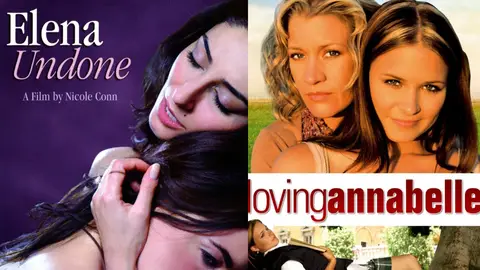Bad Lesbian Movies Hold a Special Place in the Canon, and in My Heart

“If You Can’t Teach Yourself” is a monthly series in which a young queer woman explores an LGBTQ cultural artifact in furtherance of her queer education. Think of it as your syllabus for Queer Culture 101, plus or minus some drag queens.
What comforts are helping you cope in these dark, dark times? Making your own iced coffee? Watching your fave adult performers hard at work on Just for Fans? Hosting virtual Drag Race watch parties every Friday night with two to 100 of your besties? I come to you (virtually, from the comfort of my Brooklyn apartment) with another suggestion for your queer self-care regimen: mediocre lesbian dramas from the mid-aughties and early 2010s.
There are almost too many of these films to name. I even wrote a previous "If You Can't Teach Yourself" column about Better Than Chocolate, a 20-year-old lesbian rom-com from Canada that totally fits the bill. But when the gravity of the current coronavirus pandemic sank in, two movies in particular came to mind: Loving Annabelle (2006) and Elena Undone (2010).
On a surface level, these two diamonds in the rough have little in common. Loving Annabelle focuses on its titular character (played by Erin Kelly), a clever boarding school student and rebellious queer teen who sets her sights on her teacher, Simone (Diane Gaidry). Elena Undone follows Elena (Necar Zadegan), a mother and pastor's wife whose friendship with queer writer Peyton (Thunderbird Dinwiddie) quickly becomes an emotionally charged love affair. Technically, they didn't even come out in the same decade.
But they do share two commonalities. First, and most important: Both Annabelle and Elena were available to stream on Netflix in 2013, when I, a newly out 17-year-old making up for lost time in the privacy of my childhood bedroom, sought out any and all queer-inclusive film and television I could get my grubby baby dyke hands on. (Annabelle still is, by the way, although Elena has since left the streaming giant.)
I cannot emphasize this enough: I was desperate. It was the early 2010s, and I was starved for queer media that wasn't a Tumblr post or an Autostraddle article.
My only exposure to Blue Is the Warmest Color was the graphic novel of the same name, which I'd smuggled home from my local Barnes & Noble between copies of The Fault in Our Stars and the third Divergent book before I came out. Orange Is the New Black was still brand-new, and the original L Word, though it had run from 2004 to 2009, was so jam-packed with history and fandom I wasn't privy to that I felt too daunted to even try watching it. I didn't have Sense8, The Politician, or Sex Education yet. Carol, from 2015, arguably the first masterful work of lesbian cinema to hit theaters in my queer adulthood, had barely begun production.
The second thing Annabelle and Elena have in common? As far as cinema goes, they're both really, really bad movies. I'm talking cringe-worthy acting and "lower the volume in the background and occasionally catch a snippet of dialogue that makes you go, 'Wait, what the fuck?'" levels of bad. And that's ignoring the fact that these films fall prey to some overdone, borderline problematic tropes. I mean, come on—a boarding school teacher entertaining the whims of her horny teen pupil? An artsy lesbian willingly engaging with a married woman she knows she can't have? Those storylines make for good drama, sure, but that's about the extent of the ways in which I can use the word "good" to describe them.
Neither Annabelle nor Elena offers the positive, nuanced, non-statutory-rapey representation most queer women want from movies. That's certainly true now, when beautifully shot, critically acclaimed lesbian dramas like Céline Sciamma's Portrait of a Lady on Fire, released this year, are hitting streaming services left and right. It was also true in 2013, when I first streamed these flicks.
That said, they'll always hold a soft, special place in the pockets of my gay heart, for this reason and this reason alone: They existed. They were LGBTQ dramas centering on queer women that I could access with a Netflix subscription at a time when that was actually a big ask. For that, I am forever grateful.
I'd also argue that the Annabelles and Elenas of the lesbian cinema canon paved the way for works with bigger budgets, higher production value, better-quality screenwriting, and A-list talent—think 2017's Disobedience, 2018's The Miseducation of Cameron Post, and the aforementioned gem Portrait of a Lady on Fire. In entertainment journalism circles, we half-seriously bemoan the never-ending deluge of new queer content pouring into our inboxes and queues at all times. It's easy to forget that not too long ago, having more than a meager handful of LGBTQ shows and movies to cover would have been a privilege, not an inconvenience.
In 2020, are mediocre lesbian flicks like Loving Annabelle or Elena Undone worth your time? It depends. If you're looking for an objectively good watch, then I'd say no. But these are not normal times, and if you need a ridiculous ride brimming with unintended hilarity and 2000s/2010s nostalgia, then go ahead: Stream, queen.
Loving Annabelle is available on Netflix. Elena Undone is available for purchase on Prime Video.





